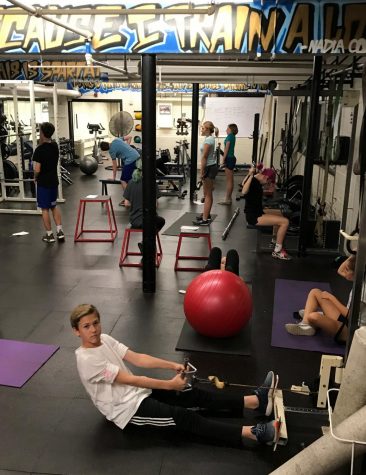Golden age of group exercise boosts faculty and student fitness

The ninth grade “Fitness for Life” class is SPA’s equivalent of a group fitness class, seen above engaged in a circuit workout. “There’s cycling, various types of yoga classes, aerobics, HIIT, boot camp, crossfit, body pump (weight lifting class), rowing, TRX class, zumba,” Anderson said.
What exactly is fitness? Is it being able to run 10 miles without breaking a sweat, hold a plank for an excessive amount of time, or simply live a long life? Upper School Physical Education teacher Cari Jo Anderson has a different answer.
“A person who wants to be intrinsically motivated to become or stay physically fit typically needs to ask a series of why’s, and then to find their niche—one huge option that is popular right now is group fitness classes,” Anderson said.
The existence of these group fitness classes is well-known, even if most students participate in team sports. The urban environment, from strip malls to downtowns, overflows with yoga, Pilates, and other cross-training facilities.
But why would anyone want to spend an hour with a roomful of sweaty strangers? “I find myself being competitive with others and feeding off of the instructor’s energy and enthusiasm for the workout, which then leads me to workout harder,” Anderson said. This sentiment has roots in group psychology: group fitness tends to motivate people to work harder compared to working alone, a phenomenon known as the Köhler effect. Research from the Journal of Sport and Exercise Psychology even found that a capable partner increased a person’s plank time by 24 percent.
I find myself being competitive with others and feeding off of the instructor’s energy and enthusiasm for the workout.
— Cari Jo Anderson
Junior Audrey Egly has never looked back after joining group fitness. “I got into group fitness because my family and I belong to Lifetime fitness, and I used to always just go with my brothers and lift upstairs by ourselves. But then my mom started to go to cycling and yoga, and it seemed interesting, so I started going with her. Then I fell in love with it, and now I go even if she can’t go,” Egly said.
While the group setting may seem like a trivial difference from working out alone, the shared experience may actually boost one’s fitness experience. “To me, there is a social aspect because you’re not alone, but at the same time I never really talk to anybody, so the social aspect is almost unspoken. You’re all kind of in it together and working out together, but it’s more of a social environment rather than social interaction,” Egly said. In fact, research in the journal Psychological Science found that collective pain not only increased solidarity, but led to group cooperation. In other words, shared pain, given a competitive spirit to the class, promotes a sense of cohesion and bonding.
It’s more of a social environment rather than social interaction.
— Audrey Egly
Yet, fitness in the United States is a multibillion-dollar industry, and the idea of “group fitness” is heavily commercialized. To Egly, the popularity of fitness classes makes instruction more accessible to those who are interesting in fitness. “I could see people getting into it because they would be like ‘Oh, I don’t really know how to do yoga, but it would be interesting.’ So then they go try it out—that’s what I did.”
There is also an alternate side to fitness classes: buying the “promise” of fitness without formulating a definition for yourself. “I think our society has become more aware, especially with the overwhelming presence on social media, for example. If people are constantly searching for the next fitness fad for losing weight or looking better, they’re going to miss out on what fitness really is, as well as not stick with it,” Anderson added.
While the definition of fitness is fluid and subjective, group fitness classes are a prime opportunity to become “intrinsically” motivated. If you are interested in signing up, these group classes abound: the golden age of group fitness has only just begun.
Sam Hanson is the Assistant Editor-in-Chief of Aureus magazine and a writer on RubicOnline. This is his third year on staff. Sam enjoys using multimedia...